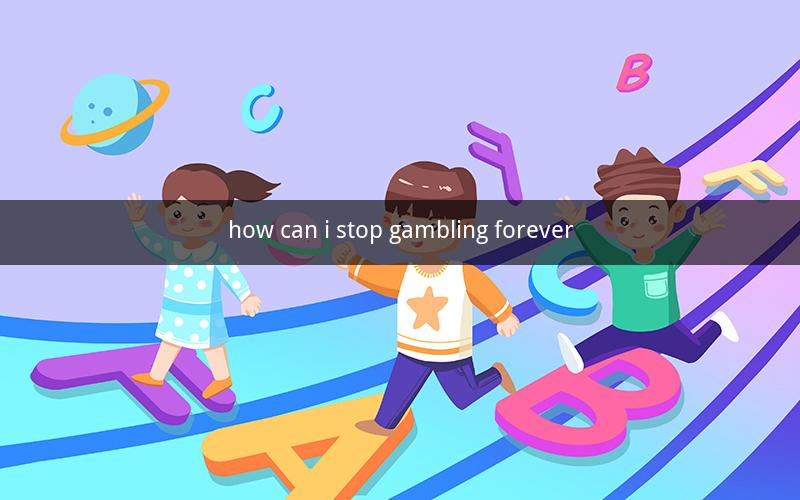
How Can I Stop Gambling Forever?
Table of Contents
1. Understanding the Problem
2. Identifying the Triggers
3. Setting Clear Goals
4. Seeking Professional Help
5. Building a Support System
6. Developing Coping Mechanisms
7. Changing Financial Habits
8. Exploring Alternative Activities
9. Monitoring Progress
10. Staying Committed
1. Understanding the Problem
To stop gambling forever, it is crucial to first understand the nature of the problem. Gambling addiction is a complex issue that affects both the mind and the body. It is characterized by an inability to control gambling behavior, despite negative consequences. Recognizing the signs of addiction is the first step towards overcoming it.
2. Identifying the Triggers
Identifying the triggers that lead to gambling is essential. These triggers can be emotional, social, or environmental. By understanding what prompts the urge to gamble, one can develop strategies to avoid or cope with these triggers effectively.
3. Setting Clear Goals
Setting clear and achievable goals is a fundamental aspect of overcoming any addiction. Establishing short-term and long-term goals can help maintain focus and motivation. Goals should be specific, measurable, attainable, relevant, and time-bound (SMART).
4. Seeking Professional Help
Professional help can be invaluable in overcoming a gambling addiction. Therapists, counselors, and support groups can provide guidance, support, and tools to manage addiction. It is important to find a professional who specializes in gambling addiction and has experience in treating similar cases.
5. Building a Support System
A strong support system is crucial for long-term recovery. This can include friends, family, support groups, or even online communities. Sharing experiences and receiving encouragement from others who have faced similar challenges can be incredibly helpful.
6. Developing Coping Mechanisms
Coping mechanisms are strategies used to deal with cravings and stress without resorting to gambling. These can include exercise, meditation, journaling, or engaging in hobbies. Developing a variety of coping mechanisms can help reduce the urge to gamble.
7. Changing Financial Habits
Gambling addiction often leads to financial problems. To overcome this, it is essential to change financial habits. This may involve creating a budget, setting aside funds for emergency expenses, and avoiding credit card use. Seeking financial counseling can also be beneficial.
8. Exploring Alternative Activities
Finding alternative activities to replace gambling can be a significant step towards recovery. Engaging in new hobbies, sports, or social activities can provide a sense of fulfillment and distract from the urge to gamble.
9. Monitoring Progress
Monitoring progress is an important part of the recovery process. Keeping a journal to track triggers, coping mechanisms, and successes can help identify patterns and areas for improvement. Celebrating milestones can also provide motivation and a sense of accomplishment.
10. Staying Committed
Staying committed to the recovery process is essential for long-term success. This involves maintaining a strong support system, continuing to seek professional help, and remaining vigilant about triggers and cravings.
---
Questions and Answers
1. What are the common signs of a gambling addiction?
- Common signs include a preoccupation with gambling, increasing the amount of money or time spent gambling, lying about gambling activities, and experiencing negative consequences due to gambling.
2. How can I recognize my triggers for gambling?
- Reflect on situations or emotions that typically lead to gambling. Keep a journal to identify patterns and triggers.
3. What are some effective coping mechanisms for gambling cravings?
- Coping mechanisms can include exercise, meditation, deep breathing exercises, or engaging in a hobby. Experiment with different strategies to find what works best for you.
4. Is it possible to overcome a gambling addiction without professional help?
- While it is possible to overcome addiction without professional help, seeking support from therapists, counselors, or support groups can significantly improve the chances of success.
5. How can I change my financial habits to prevent gambling?
- Create a budget, set aside funds for emergencies, and avoid using credit cards. Consider seeking financial counseling to develop healthy financial habits.
6. What are some alternative activities that can replace gambling?
- Explore new hobbies, sports, social activities, or volunteer work. Engaging in activities that provide a sense of fulfillment can help reduce the urge to gamble.
7. How often should I monitor my progress in overcoming gambling addiction?
- Regular monitoring, such as daily or weekly, can help you stay aware of your progress and make adjustments as needed.
8. What should I do if I relapse after overcoming a gambling addiction?
- If you relapse, it is important to acknowledge it and seek support. Reflect on what led to the relapse and consider adjusting your coping mechanisms or seeking additional help.
9. Can family therapy be beneficial in overcoming a gambling addiction?
- Yes, family therapy can be highly beneficial. It can help family members understand the addiction and develop strategies to support the individual in recovery.
10. How long does it typically take to overcome a gambling addiction?
- The duration of recovery varies for each individual. Some may experience immediate success, while others may require ongoing support and treatment for several years.